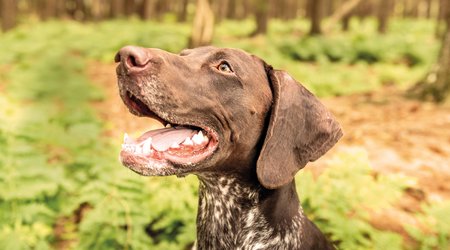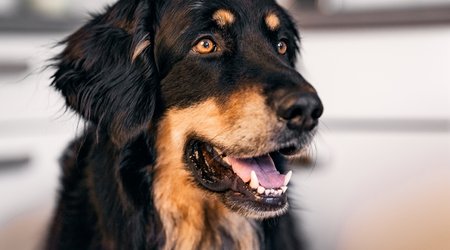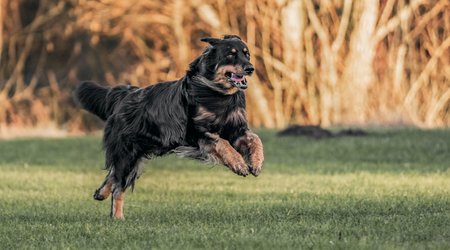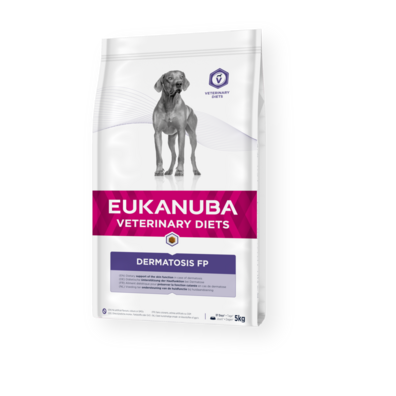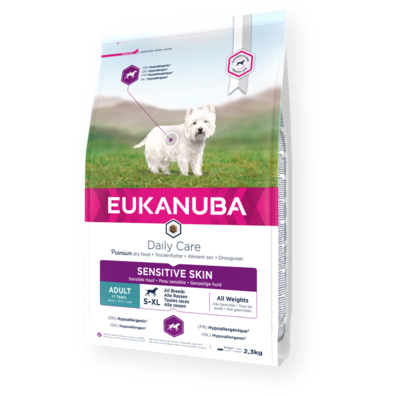So halten Sie Haut und Fell Ihres Hundes gesund
Haut und Fell Ihres Hundes bilden das größte Organ seines Körpers und machen etwa 12 % seines Körpergewichts aus. Abgesehen von seinem wunderbaren Aussehen spielt die Haut eines Hundes eine große Rolle für seine allgemeine Gesundheit - sie schützt seinen Körper vor Verletzungen und Infektionen, hilft bei der Kontrolle seiner Temperatur und dient als erste Verteidigungslinie. Das Fell isoliert den Körper und schützt die Haut vor Verletzungen und Schäden durch Hitze, Sonnenlicht und Reizstoffe.
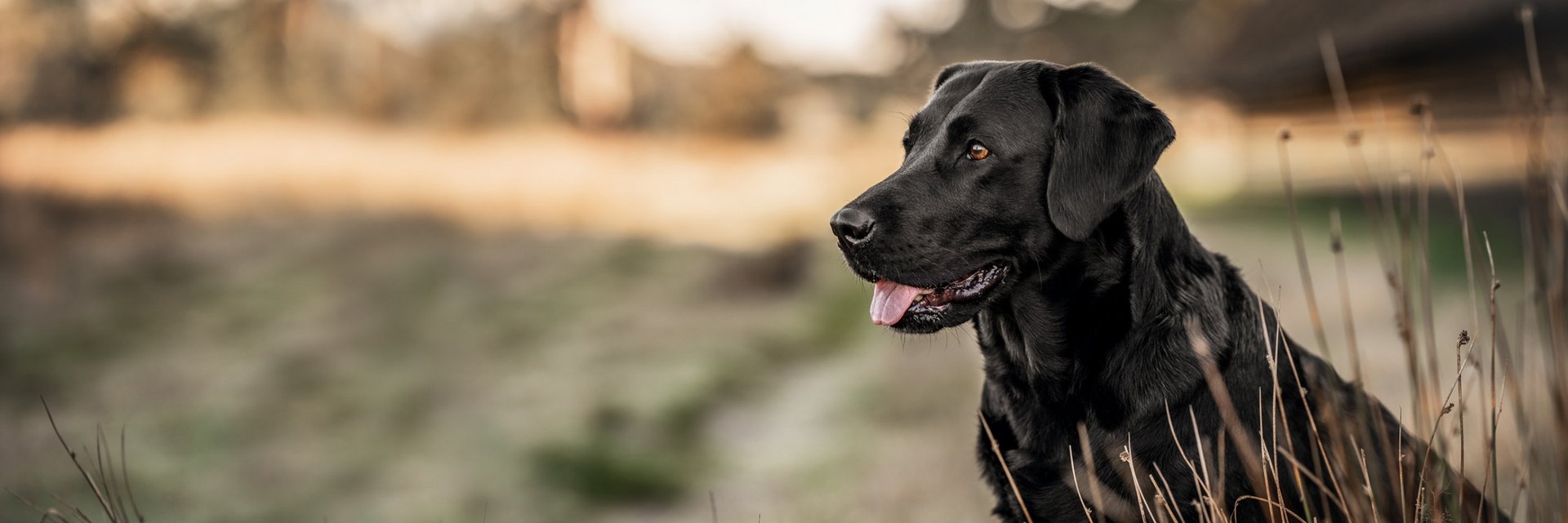
Fellpflege
Warum ist das Fell des Hundes so wichtig?
Viele Leute denken, dass es zwei Fellarten gibt - Langhaar oder Kurzhaar. Dies stimmt bis zu einem gewissen Grad. Aber es gibt auch glattes, lockiges und seidiges Fell, Stockhaar sowie Fell mit und ohne Unterwolle. Die verschiedenen Rassen weisen viele unterschiedliche Felltypen auf. Nicht selten spiegelt das Fell den ursprünglichen "Arbeits"-Zweck des Hundes wider.
Labradore zum Beispiel haben ein kurzes, anliegendes Fell mit dichter Unterwolle, das ihnen ein hohes Maß an Wasserabweisung und Isolierung verleiht - unerlässlich für ihre ursprüngliche Rolle als Wasserhunde. Viele Terrier haben ein kurzes, dickes und raues Fell – ein idealer Schutz gegen Stacheln und Dornen, die im Unterholz und Gestrüpp zu finden sind. Doch egal wie Haut und Fell Ihres Hundes beschaffen sind, die Funktion ist immer gleich.
Qualitativ hochwertiges tierisches Eiweiß
Futter für Haut- und Fellgesundheit
Das Fell eines Hundes besteht zu 95 % aus Eiweiß1, daher ist es unerlässlich, dass das Futter hochwertiges tierisches Eiweiß wie Huhn, Lamm und Fisch enthält. Dieses bietet spezielle Aminosäuren, die die richtige Versorgung von Haut und Fell gewährleisten und eine gesunde Struktur und Funktion unterstützen. Hunde verbrauchen so viel Energie für das Fellwachstum, dass bis zu 35 % der täglichen Proteinzufuhr eines Hundes genutzt wird, um Fell und Haut in gutem Zustand zu halten. Gesunde Haut ist weich und geschmeidig und die Wurzeln der Haare sind tief in die Haut eingebettet. Omega-6- und Omega-3-Fettsäuren fördern die Produktion lebenswichtiger Öle und Wachse, die Trockenheit verhindern und ein sichtbar gesundes Fell unterstützen. Weitere wichtige Nährstoffe für die Haut- und Fellgesundheit sind die Vitamine A, C und E sowie Zink, Kupfer und Biotin. Neben der richtigen Ernährung hilft die regelmäßige Fellpflege Ihres Hundes , Haut und Fell in bestmöglicher Kondition zu erhalten.
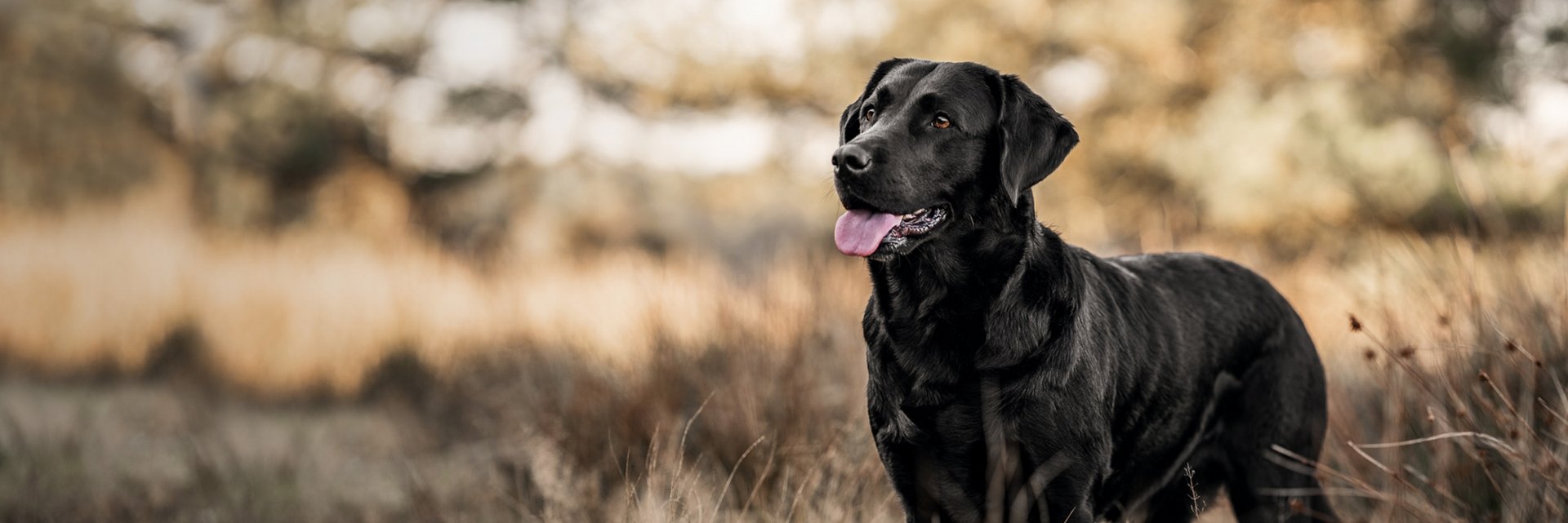
Eukanuba als Partner
Ernährungskompetenz seit 1969
EUKANUBA's speziell konzipiertes Hundefutter, basierend auf jahrelanger Erfahrung seit 1969, enthält alle wichtigen Inhaltsstoffe, um eine gesunde Haut und ein gesundes Fell von innen zu unterstützen. Jedes Rezept ist auf die Bedürfnisse Ihres Hundes in den einzelnen Lebensphasen zugeschnitten. Vom Welpen zum Junior, vom erwachsenen zum älteren Hund - so können Sie sicher sein, dass Ihr Hund alles bekommt, was er braucht, um eine optimale Körperkondition und ein prächtiges Fell zu unterstützen. Um das Fell Ihres Hundes zu verbessern, empfehlen wir die regelmäßige Fellpflege; ein hochwertiges deShedding Tool - einmal wöchentlich genutzt - reduziert ebenfalls lose Haare.
Quellenangabe:
1 DAVENPORT GM, ET AL. THE IMPACT OF NUTRITION ON SKIN AND HAIR COAT. IN: CURRENT RESEARCH IN DERMATOLOGY. PROCEEDINGS FROM PRE-CONGRESS SYMPOSIUM, 4TH WORLD CONGRESS OF VETERINARY DERMATOLOGY, SAN FRANCISCO, 2000; 4-9
Keeping your dog's skin and coat healty
Your dog’s skin and coat forms the largest organ in their body, accounting for about 12% of their body weight. Apart from its wonderful appearance, a dog’s skin has a huge role to play in their overall health – protecting their body from injury and infection, helping control their temperature and acting as their first line of defence. Their fur insulates the body and protects the skin from trauma and damage due to heat, sunlight and irritants

Why is a dog's coat so important?
Because it reflects the original purpose of the dog
Many people think of dogs as having one of two coat types – long-haired or short-haired. This is true to some extent but there’s also straight-haired, curly-haired, wire-haired, flat-haired, feathered, not to mention single coat and double coats. The various breeds have many different coat types, quite often reflecting the original ‘working’ purpose of the dog.
Labradors for instance have a short, flat, double coat with a dense under layer that provides them with a high degree of water resistance and insulation – essential for their original role as water dogs.
Many terriers have short, thick, rough coats – providing ideal protection against barbs and thorns which are found in undergrowth and thickets. Whatever your dog’s skin and coat type, it shares the same crucial functions
High quality animal protein is essential
Feeding for a healty skin and coat
A dog’s coat is 95% protein1 so providing food which contains high quality animal protein, such as chicken, lamb and fish, is essential. This provides special amino acids to ensure the skin and coat are properly nourished, supporting healthy structure and function. Dogs use so much energy growing their coats that up to 35% of a dog's daily protein intake is needed just to keep their coat and skin in good condition.
Healthy skin is soft and pliable with the roots of hair deeply embedded in the skin. Fatty acids omega 6 and omega 3 promote the production of vital oils and waxes that prevent dryness and maintain a visibly healthy coat. Other nutrients important to skin & coat health include the vitamins A, C, and E, zinc, copper and biotin.
As well as feeding them the right diet, grooming your dog regularly will help to keep their skin and coat in the best possible conditio

Your reliable partner
Nutritional expertise since 1996
EUKANUBA’s specially formulated dog food, based on years of expertise since 1969, includes all of the ingredients critical to help support a healthy skin and coat from the inside. Each life stage formula is tailored to the needs of your dog, so from puppy to junior, adult to senior, yo u can be assured that your dog gets everything they need to support optimal body condition and a magnificent coat.
To further improve your dog’s coat, we recommend regular grooming; using a good quality de-shedding tool once a week will also reduce loose hair.
References:
1 DAVENPORT GM, ET AL. THE IMPACT OF NUTRITION ON SKIN AND HAIR COAT. IN: CURRENT RESEARCH IN DERMATOLOGY. PROCEEDINGS FROM PRE-CONGRESS SYMPOSIUM, 4TH WORLD CONGRESS OF VETERINARY DERMATOLOGY, SAN FRANCISCO, 2000; 4-9.
